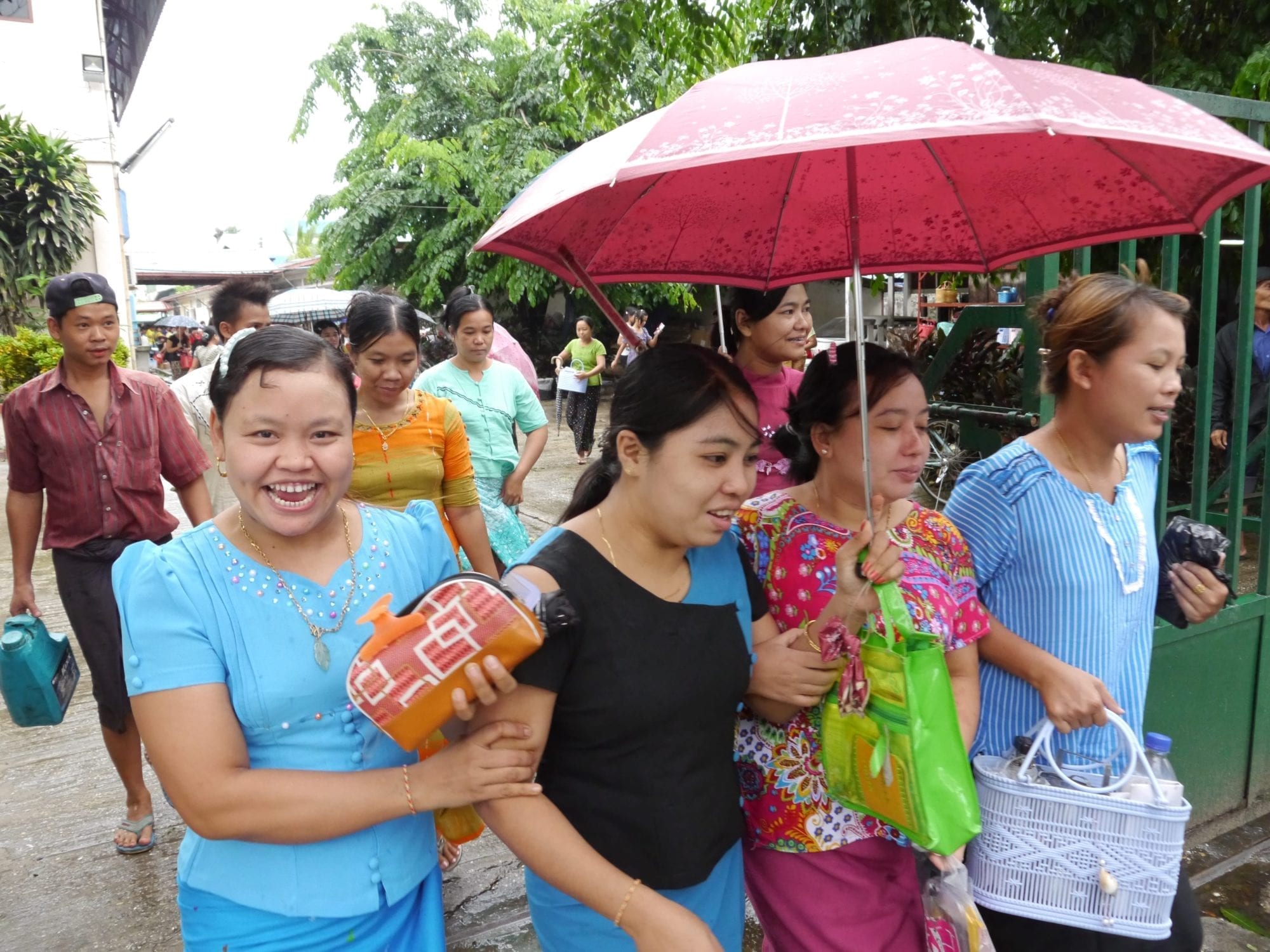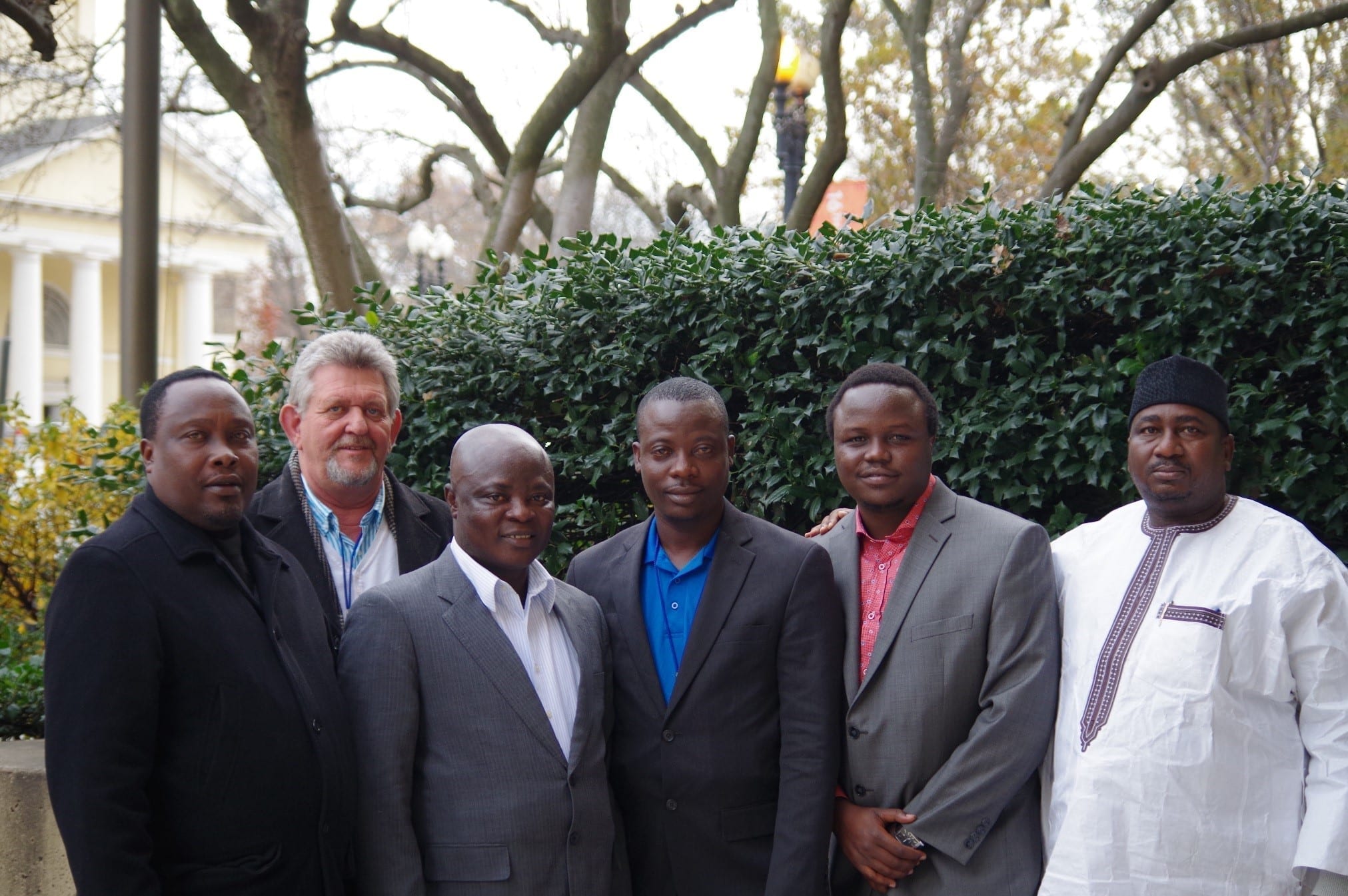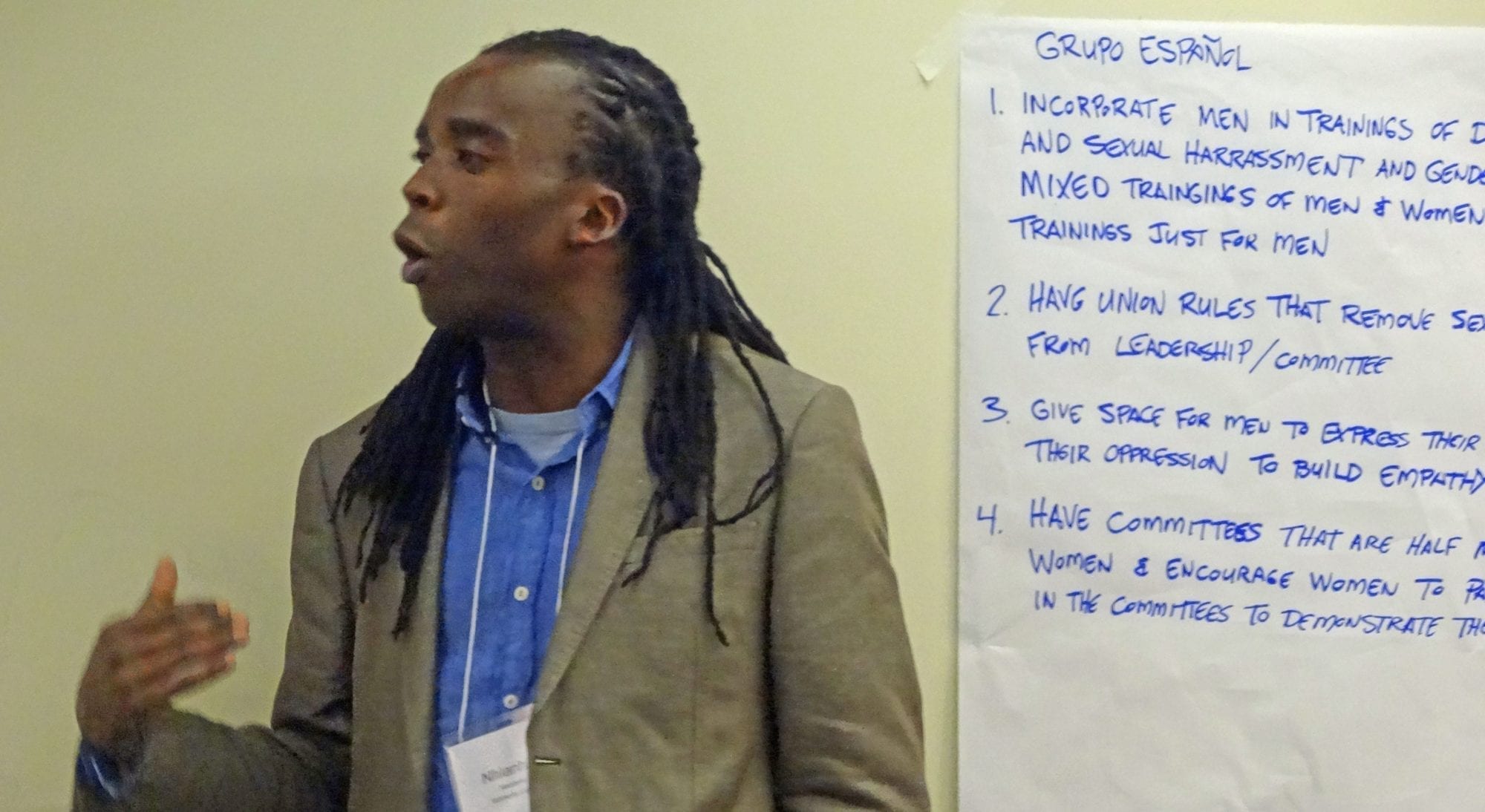Jan 13, 2017
Writes Solidarity Center’s Tim Ryan: “Over the past 20 years, awareness and activism around the issues of child labor, slavery and human trafficking have grown significantly, mirrored by both growing economic inequality and broad concerns about that inequity. [There] is a clear recognition that decent work for adults can create a more secure environment for children and their opportunities for education.”
Jan 13, 2016
At least four garment workers lost their lives yesterday and dozens more were injured when the two flat-bed trucks they were commuting to work on collided, according to Solidarity Center staff at the site of the incident. One of the trucks was carrying 50 people and the other more than 70 workers. The deaths left at least eight children without their mother.
Agence France-Presse reports that 13 of the injured workers are in critical condition.
The incident happened as the Solidarity Center’s legal team was in court overseeing disbursement of the settlement to victims and surviving families of a bus crash that killed 19 workers and injured another 20 people last spring. Families of the deceased and workers injured in the May 2015 incident attended the court session, where they received meager payments of between $1,500 and $3,000 for the loss of their loved ones or their pain and suffering. After almost a year, a number of workers who survived say they have not received compensation due them from the National Social Security Fund (NSSF).
Cambodia’s garment sector features notoriously dangerous and largely unregulated transportation for its workers, who crowd onto open-air trucks to save money. According to Women’s Wear Daily, “73 garment workers died from traffic accidents while going to work, while 789 were injured” in 2014. Meanwhile, more than 7,000 garment workers were injured and 130 killed while they were being transported to and from factories in 2015, according to the National Social Security Fund (NSSF).
“The extremely high number of fatalities and injuries is completely unacceptable,” said William Conklin, Solidarity Center Cambodia program director. “Garment workers, or any other workers, should not have to fear for their life each day on the commute to and from work. Yet they do because of the confluence of low wages and high disregard for the lives of workers on the part of authorities and factory owners. Labor here is just a commodity.”
Cambodian unions say wages are vital to safe transport for Cambodian workers, and freedom of association is crucial to collective bargaining for higher wages. Just a short distance from the site of Tuesday’s crash, workers at a sweater factory continued their strike demanding, among other things, a $3 increase in the monthly transport allowance. The response from the factory and the authorities was a violent crackdown on striking workers, arresting five and injuring about 30 people, two of them seriously.

Jan 6, 2016
Whether building a towering office building in downtown Zimbabwe, sewing garments in a Bangladesh factory or digging for phosphate in Mexico mines, the world’s unsung working people demonstrate, time and again, the dignity of work. Here, we celebrate some of the amazing women and men we partnered with in 2015, and showcase their efforts to improve their lives and livelihoods and tip the scales toward greater equality in their countries.
As Mervat Jumhawi, a former garment worker and union organizer working with the Solidarity Center in Jordan, described her own experience: “When I became member of the union, I became stronger.”
[portfolio_slideshow id=6893]

Dec 10, 2015
Addressing unemployment and underemployment, especially for young workers, is the most pressing issue for trade unions across Africa, according to participants in an African Labor Leaders Exchange Program sponsored by the Solidarity Center.
Speaking at a December 9 panel discussion at the AFL-CIO in Washington, D.C., six union leaders from Kenya, Liberia, Nigeria and South Africa discussed the challenges in securing economic prosperity for working people—and their strategies for empowering workers in the formal and informal economies.
“What faces us is high levels of unemployment, poverty,” said Edward de Klerk, deputy general secretary of South Africa’s United National Transport Union (UNTU).
“Unemployment is an African issue,” said Philip Kwoba, director of Youth Organizing with the Central Organization of Trade Unions (COTU) in Kenya. Unions in Kenya are reaching out to informal economy workers, which include many young workers, helping them form worker savings associations as a step toward unionization and gaining bargaining rights. “We are allocating resources to help,” said Kwoba.
Members of the panel, moderated by Solidarity Center Regional Program Director for Africa Imani Countess, said poverty also is fueled by low wages. “Wage inequality is this battle still we have got,” said de Klerk. In Nigeria, unions are tackling wage issues by addressing government policies that reduce the pay of public-employees, including teachers, said Muhammed Nasir Idris, National Treasurer Nigeria Union of Teachers (NUT).
Lack of employment opportunity and poverty in Liberia puts youth at risk of labor trafficking within the country’s borders, said Liberia Labor Congress (LLC) General Secretary David Sackoh.
Sackoh said labor recruiters take children from parents in their villages, promising the children will go to school in the city. Instead, the children are used in forced labor. “Even though our research shows (the children) want to return,” they are unable to do so for seven to 10 years,” he said.
Sackoh pointed to the Liberian trade union movement’s tremendous victory in eradicating child labor at the Firestone Natural Rubber Liberia plantation, and said the union movement now is working to address the issue at the seven other plantations across the country.
During questions with the audience, which included a packed crowd of union activists, policy experts and international experts, union leaders also discussed drawing more women into trade union leadership.
“Getting women elected to high offices is now on the union agenda,” said Boniface Kavuvi, general secretary of the Kenya Union of Commercial, Food and Allied Workers (KUCFAW). Kavuvi pointed to domestic workers in Kenya, represented by KUDHEIHA, as an example of dynamic organizing and strong leadership by women in Kenya. “They have done a tremendous job,” he said.
In Liberia, unions are pushing for 30 percent representation by women in union leadership, mirroring the country’s effort to increase women’s representation in the national legislature, said Isaac Grant, LLC organizing coordinator.
The six union leaders traveled to the United States for a South–South labor leaders’ exchange in which African labor leaders met with community and trade union organizers across the southern United States. The Solidarity Center worked with the U.S.-based labor education program, the National Labor Leadership Initiative (NLLI), to facilitate the exchange, sponsored by the U.S. Department of State’s Bureau of Educational and Cultural Affairs.

Oct 30, 2015
Nhlanhla Mabizela says he first truly grasped the meaning of gender inequality on a winter day in the dusty streets of Alexandra Township in post-apartheid South Africa.
Cutting through an alley surrounded by houses made of iron scrap and plastic sheets, Mabizela and a friend came across a group of children playing. All were barefoot in the cold, with a single layer of clothes he assumed were the only ones they owned.
“Guess the first thing that popped in our minds?” asks Mabizela, Solidarity Center program officer for gender. “Where are the mothers of these children?” Seconds later, he and his friend encountered groups of men sitting around a fire, drinking and laughing. Nearby, they also saw a woman doing laundry in a large corrugated bathtub, her hands immersed in icy water.
“There and then we had the answer to our question and a new one was born and it was, ‘What is happening in the mens’ minds?’ That was the day when it dawned on me that gender inequality is alive and some of us are quite comfortable with it.”
Solidarity Center Helps Unions Put Gender Equality into Practice
Solidarity Center programs around the world address gender inequality at the workplace and within unions and society. In South Africa, Mabizela holds trainings to empower women to join unions and take leadership roles and advocate for themselves and their families. Crucially, his workshops also focus on helping men understand cultural expectations and how those assumptions shape male leadership roles that are based on excluding women.
Mabizela’s work highlights a frequent dichotomy. Unions are key drivers in advancing gender equality. Yet in many countries around the world, there is a disconnect between labor union policy and practice in transforming gender inequalities within their own structures. Through the lens of the South African union movement, a new report commissioned by the Solidarity Center explores the disconnect and examines new strategies for closing the gap between policy and practice.
“Putting Union Gender Equality into Practice: The Role of Transformational Leadership” describes how “feminist leadership” can be encouraged within the South African trade union context in part by creating a democratic organizational culture and an environment that supports women workers in their struggle for emancipation and assists men to free themselves from patriarchal forms of power.
“We have internalized and institutionalized gender roles and the division of labor,” says Mabizela. “We have failed as a country to interrogate patriarchy and hence we will move four steps forward and six steps backwards. We are so immersed in the debates about political power at the expense of all the other oppressions in sexism.”
‘Everything Is Structured around Men’
South African unions and federations long have sought to redefine and reshape patriarchal structures, cultures and practices to better inhere gender equality. Beginning in 2005, several South African unions sought to develop alternative models of power after recognizing that male-dominated, hierarchical, union culture does not easily address such issues as violence against women and sexual harassment of women within the union. They took part in Gender at Work’s South African Gender Action Learning Program to employ gender-inclusive and accountable power building and power sharing.
Authors of the new study interviewed the men who took part, and reported that they expressed an appreciation of how, by challenging male stereotyped behaviors and aspects of patriarchal power relations, they have enriched their private and public relationships and strengthened their commitment to gender equality.
“The much broader question is the need to look at how male culture influences everything—how everything is structured around men,” says John Apollis, a leader from the General Industrial Workers Union (GIWUSA) who is quoted in the report. “We need a fundamental reorganization of the union otherwise we are not going to get far with breaking male dominance.”
Some of the men also noted they struggle with alienation by their peers, who see their efforts to incorporate gender equality in the union and at home as setting them apart from traditional male roles.
‘I Would Not Like to Rehash What Our Fathers Did’
Mabizela says he was aware of gender inequality even in childhood, when the girls would “disappear” after school to wash dishes or clean house, while the boys played outside.
But the winter day in Alexandria Township spurred him to “reflect on how easy it was for us (me and my friend) both men, to put the burden of care squarely on women’s shoulders and be oblivious to the effects of gender-based violence. That day still exists in many parts of this world and not only in shanty towns of South Africa, but also in the leafy suburbs of the affluent.”
As Solidarity Center gender program officer, Mabizela also works with other organizations to campaign for passage of national laws, like a minimum wage for South Africa’s 1 million domestic workers which became law last December. Parliament currently is considering an expanded maternity leave law that incorporates significant input by the Solidarity Center.
He works with four South African union federations on the International Trade Union Confederation’s Labor Rights for Women Campaign and assists federations in developing sexual harassment policies and gender policies. He brings to his work experience as a peer educator for me at Planned Parenthood of South Africa and as a program officer for EngenderHealth’s Men as Partners Program.
In striving to embody the change essential for advancing gender equality in South Africa, Mabizela is blazing a trail for others. When describing the influences that motivate his work, Mabizela says he often thinks about how much he yearned to have a father in his life when he was a child—an experience he later learned was not uncommon.
Now, as the father of an 11-year-old son, Mabizela says, “the thought that I would not like to rehash what our fathers did, motivates me to do the work that I do. Observing my son grow, and developing confidence and not being afraid to show his emotions—it is enough motivation to carry on for his sake and the betterment of our societies.”



